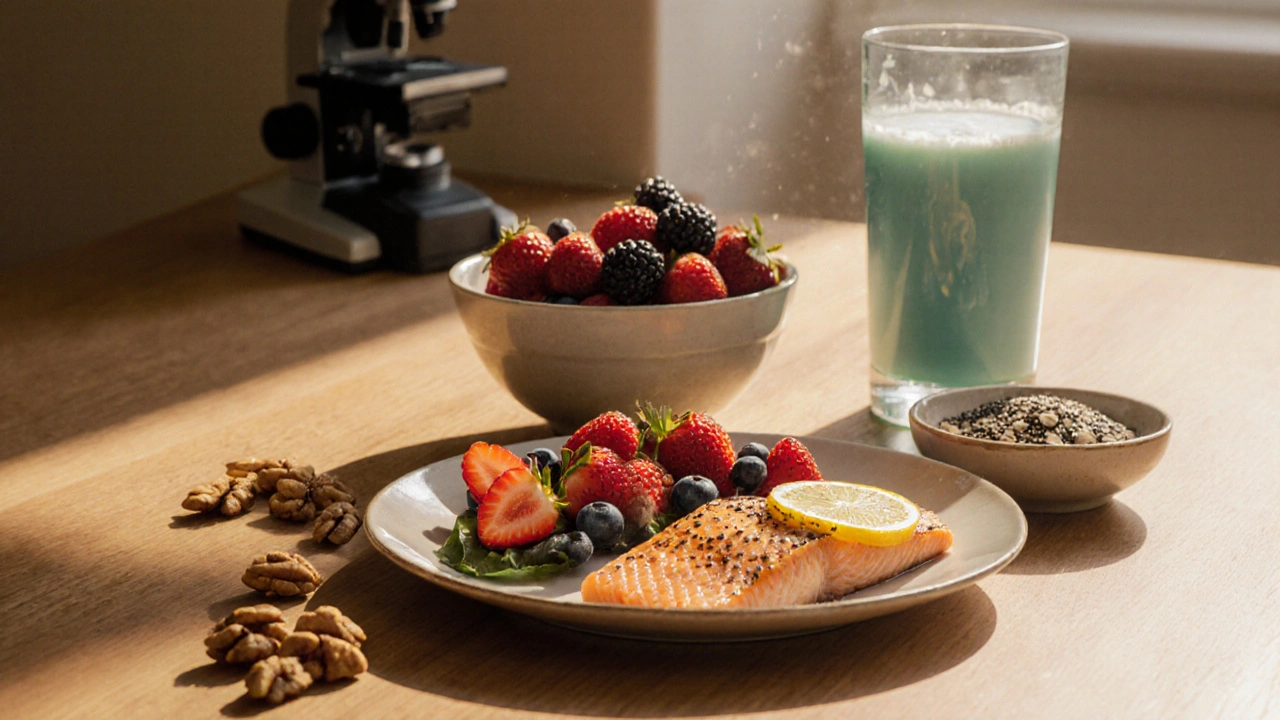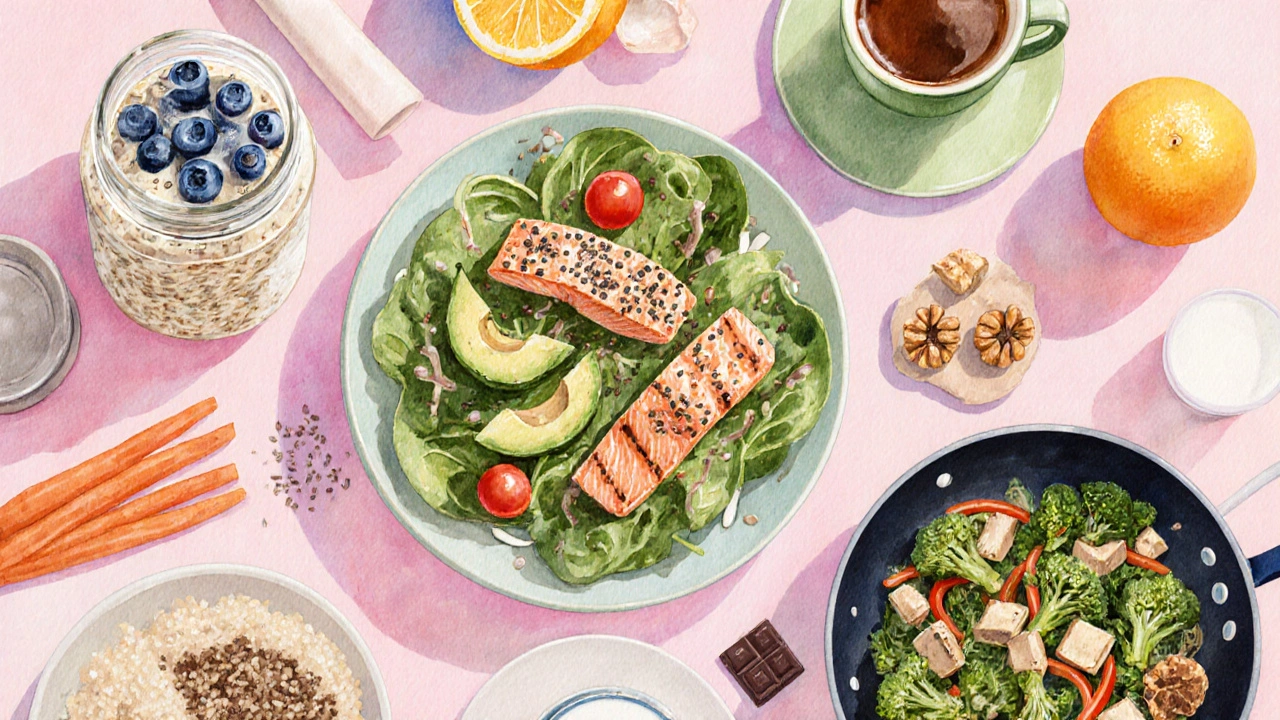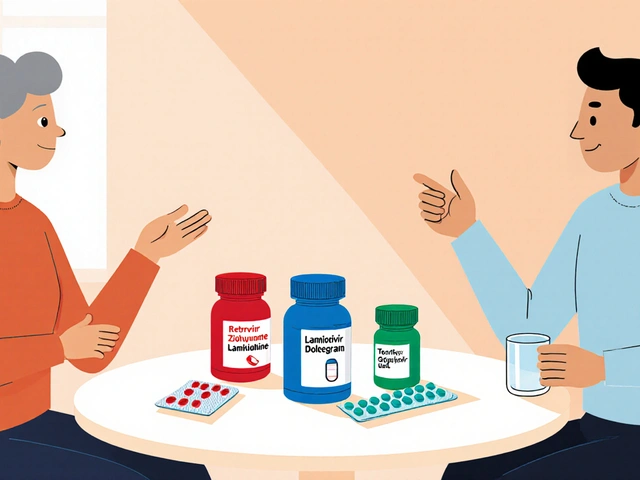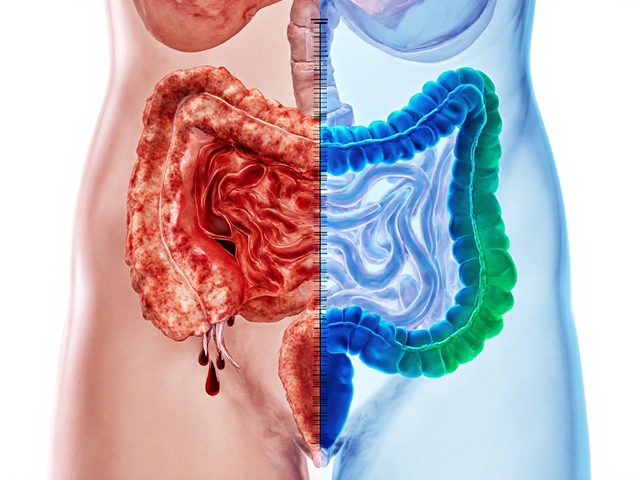
CLL Nutrition Planner
Your Personalized Nutrition Analysis
Enter your details and click 'Analyze My Nutrition Plan' to see personalized recommendations.
Evidence-Based Nutrients for CLL
Omega-3 Fatty Acids
Reduces inflammation and supports immune function
Vitamin D
Strengthens immune system and may improve survival
Antioxidants
Protects cells from oxidative stress
Folate
Supports DNA repair and cellular function
When dealing with Chronic Lymphocytic Leukemia, a slow‑growing blood cancer that primarily affects B‑lymphocytes, patients often wonder if what they eat can sway the disease course or ease treatment side‑effects. The good news is that emerging research shows specific dietary patterns and nutrients can influence immune function, inflammation, and even the effectiveness of therapies. Below you’ll find a practical roadmap that blends the latest science with everyday kitchen tips.
Key Takeaways
- Balanced, plant‑rich meals can lower inflammation and support immune health in CLL.
- Omega‑3 fatty acids, vitamin D, and antioxidant‑rich foods have the strongest evidence for benefit.
- Avoid excessive processed meat and sugary drinks, which may worsen fatigue and blood counts.
- Coordinate any major diet changes with your hematologist or nutrition therapist.
- Small, sustainable tweaks beat drastic, short‑term diets for long‑term wellbeing.
How Nutrition Talks to CLL Biology
Nutrition the intake of macro‑ and micronutrients that fuel the body interacts with CLL at several levels. First, chronic inflammation creates a micro‑environment that can protect malignant B‑cells. Certain foods-especially those high in saturated fat and refined sugars-raise inflammatory markers like C‑reactive protein, which may accelerate disease progression.
Second, the immune system relies on micronutrients to mount a proper response. Deficiencies in vitamin D, omega‑3 fatty acids, and antioxidants can blunt the activity of natural killer cells that normally keep cancer cells in check.
Finally, many CLL treatments (chemo‑immunotherapy, targeted agents, and emerging immunotherapy) cause side‑effects such as nausea, taste changes, and bone‑density loss. Tailored nutrition can mitigate these issues, keeping patients stronger and more adherent to therapy.

Evidence‑Backed Nutrients for CLL
Below is a snapshot of the nutrients that have shown the most promise in clinical or observational studies involving CLL patients.
| nutrient | evidence strength | typical food sources | suggested intake |
|---|---|---|---|
| Omega‑3 fatty acids | moderate (small RCTs show reduced inflammation) | fatty fish, flaxseed, walnuts | 2‑3 servings of fish/week or 1g EPA/DHA supplement |
| Vitamin D | strong (low levels linked to poorer survival) | sun‑exposed skin, fortified milk, fatty fish | 800‑1,000IU daily, higher if deficient |
| Antioxidants (vitamins C, E, selenium) | moderate (observational data suggest lower DNA damage) | berries, citrus, nuts, seeds, green leafy veg | 5‑7 servings of fruits/veg daily |
| Folate | emerging (may support DNA repair) | leafy greens, legumes, whole grains | 400µg DFE per day (dietary) |
These numbers are guidelines-not prescriptions. Always talk to your care team before adding high‑dose supplements, especially if you’re on immunotherapy or anticoagulants.
Putting It Into Practice: Daily Meal Blueprint
A realistic day on a CLL‑friendly plate might look like this:
- Breakfast: Overnight oats made with fortified almond milk, topped with blueberries, chia seeds, and a handful of walnuts.
- Mid‑morning snack: A small orange and a cup of green tea (rich in catechins, a type of antioxidant).
- Lunch: Spinach salad with grilled salmon, cherry tomatoes, avocado, and a drizzle of olive oil‑lemon dressing. Add a side of quinoa for extra B‑vitamins.
- Afternoon snack: Carrot sticks with hummus (provides plant‑based protein and folate).
- Dinner: Stir‑fry tofu, broccoli, bell peppers, and bok choy in garlic‑ginger sauce, served over brown rice. Finish with a glass of fortified milk for calcium and vitamin D.
- Evening: If you feel like a treat, a square of dark chocolate (≥70% cocoa) supplies modest antioxidants.
Notice the emphasis on oily fish or plant‑based omega‑3 sources, colorful veg for antioxidants, and vitamin‑D‑rich dairy or sunlight exposure. Hydration matters, too-aim for 8‑10 cups of water daily to help kidneys flush treatment metabolites.
Common Myths and Pitfalls
It’s easy to get tangled in diet hype. Here are the most frequent misconceptions:
- “Cutting all protein will starve cancer.” Protein is vital for blood cell repair and immune cells. Instead, choose lean or plant‑based proteins and keep portions moderate.
- “Juice cleanses reset the immune system.” Juices strip fiber and can cause blood‑sugar spikes, worsening fatigue.
- “High‑dose antioxidant supplements protect against chemotherapy.” Large amounts may interfere with drug‑induced oxidative stress that helps kill cancer cells. Stick to food sources.
- “Gluten‑free automatically means healthier.” Many gluten‑free processed foods are low in fiber and high in sugar, offering no real benefit for CLL.
The safest route is a balanced, whole‑food diet with gradual adjustments rather than sweeping restrictions.
Coordinating Nutrition with Your Treatment Plan
Whether you’re on chemotherapy, immunotherapy, or newer BTK inhibitors, nutrition should be an integral part of the care team discussion.
Ask your hematologist the following:
- Do any of my medications interact with specific supplements (e.g., high‑dose vitaminE with anticoagulants)?
- Should I adjust caloric intake during periods of severe fatigue or neutropenia?
- Is there a preferred timing for meals around treatment sessions to minimize nausea?
Many cancer centers now employ dietitians specializing in hematologic malignancies. Their role is to turn the science above into a personalized plan that respects your cultural food preferences and lifestyle.
What the Future Holds: Research Trends
Researchers are exploring the gut microbiome’s influence on CLL response to therapy. Early data suggest that a diet high in fiber and fermented foods (e.g., kefir, sauerkraut) may favor beneficial bacteria that boost immune checkpoint efficacy. While still experimental, staying ahead with a microbiome‑friendly diet could become a standard recommendation.
Another promising avenue is the use of plant‑derived compounds like curcumin or resveratrol as adjuncts to targeted therapy. Small trials report modest reductions in inflammatory cytokines, yet more robust studies are needed before routine use.
For now, focusing on the evidence‑backed nutrients listed earlier offers the most reliable way to harness food as a supportive tool in managing CLL.
Frequently Asked Questions
Can I cure CLL with diet alone?
No. Nutrition can improve quality of life, reduce treatment side‑effects, and possibly slow disease progression, but it does not replace medical therapy.
Should I avoid all red meat?
Moderation is key. Small portions of lean red meat are fine; however, limit processed meats (e.g., bacon, sausages) because they raise inflammation.
How much vitamin D should I take?
Most CLL patients benefit from 800‑1,000IU daily, but a blood test is ideal to tailor the dose. High doses (>4,000IU) should only be taken under supervision.
Is it safe to use omega‑3 supplements with my medication?
Generally yes, but if you’re on blood thinners, discuss dosage with your doctor because omega‑3s can mildly affect clotting.
Can fermented foods help my immune system?
Early studies link probiotic‑rich foods to a healthier gut microbiome, which may enhance immune surveillance. Including a few servings a week is low‑risk and potentially beneficial.
Putting these pieces together creates a nutrition framework that supports your body while you undergo treatment for Chronic Lymphocytic Leukemia. Remember, the goal isn’t a miracle diet; it’s steady, evidence‑based choices that make you feel stronger day‑to‑day. By partnering with your medical team and focusing on whole‑food foods rich in omega‑3s, vitaminD, and antioxidants, you give yourself the best possible nutritional advantage in the fight against CLL.
For anyone wondering how to start, the simplest step is to swap one processed snack a day for a piece of fruit or a handful of nuts-tiny changes add up over months and years.
nutrition CLL is a growing field, and staying informed will keep you ahead of the curve.




13 Comments
Great job putting together this CLL nutrition guide 😊. It's exactly what we needed to count fish servings while debating vitamin D levels.
Seriously, this seems like a laundry list of buzzwords instead of real advice. Cut the fluff and tell us what actually works.
I feel like this tool is trying to sell me a miracle but I’m exhausted from the constant hype I’m just so tired of the promises I can’t even breathe
If you’re battling CLL, congratulations on discovering yet another spreadsheet of nutritional recommendations.
Let’s start with omega‑3s: they’re touted for reducing inflammation, but the clinical evidence in leukemia is still largely observational.
That means you can’t expect a magic bullet, just a modest tweak that might support overall immune health.
Vitamin D deficiency is common in cancer patients, so checking levels is sensible, yet supplementation should be guided by your oncologist.
High doses without monitoring can lead to hypercalcemia, which is obviously not a good trade‑off.
Antioxidants, meanwhile, have a controversial role; while they protect cells from oxidative stress, some studies suggest they could blunt chemotherapy efficacy.
If you’re undergoing treatment, discuss antioxidant intake with your care team before loading up on berries or supplements.
Folate is essential for DNA synthesis, but excessive folic acid supplementation may feed rapidly dividing malignant cells.
Again, moderation and medical guidance are key.
Physical activity, even light walking, has been linked to improved fatigue scores in CLL patients, so keep moving within your limits.
However, overexertion can suppress immune function, so listen to your body.
Fish consumption brings omega‑3s naturally, but watch for mercury exposure, especially with larger predatory species.
A balanced diet rich in whole foods, lean protein, and fiber is more reliable than any single superfood.
Don’t forget hydration; adequate fluids help maintain kidney function, especially when receiving certain chemotherapies.
Bottom line: use this planner as a conversation starter with your healthcare team, not as a substitute for personalized medical advice.
Stay strong and keep fueling your body with real food-your cells will thank you!
Looks like someone copy‑pasted a Wikipedia entry and called it a plan.
I appreciate the effort put into compiling these nutrients. With careful monitoring, such guidance can complement standard CLL care.
Interesting overview. I’d be curious to see how these suggestions align with individual lab results.
Oh great, another elite nutrition fad for cancer patients. As if diet alone can cure CLL.
While it’s true diet isn’t a cure‑all, dismissing any nutritional support undermines patient empowerment. Evidence‑based tweaks can still improve quality of life.
Promoting these guidelines without highlighting the socioeconomic barriers feels irresponsible. Not everyone can afford fresh fish or supplements.
All that talk about balance just repackages generic health advice. Nothing new here.
Absolutely! 🎉 Remember, sharing culturally relevant recipes can make sticking to the plan more enjoyable for everyone.